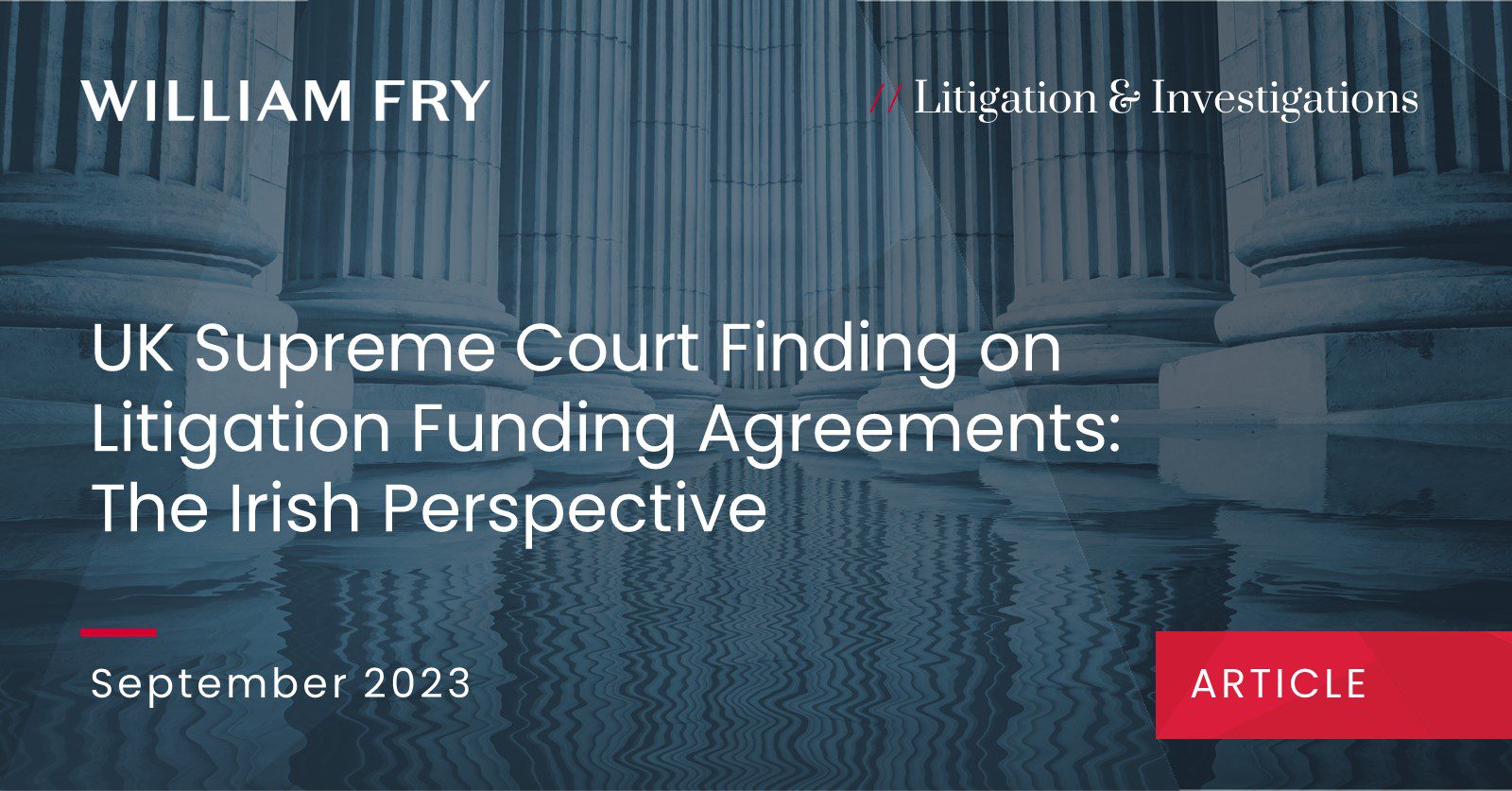Given the LRC’s recent Consultation Paper on litigation funding, the UK Supreme Court decision in R(PACCAR) v CAT should be borne in mind.
In R (on the application of PACCAR Inc and others) v Competition Appeal Tribunal [2023] UKSC 28, the second and third named respondents, UK Trucks Claim Ltd (UKTC) and Road Haulage Association Ltd (RHA), each sought an order from the Competition Appeal Tribunal (CAT) for permission to enable them to bring collective proceedings on behalf of people who obtained trucks from DAF (a trucks manufacturer) and other truck manufacturers. The respondents were seeking compensation for allegedly higher prices paid because the truck manufacturers operated a cartel contrary to EU competition law.
Under the CAT rules, the respondents had to show they could pay their and the other side’s recoverable costs. UKTC and RHA relied on litigation funding agreements (LFAs) to demonstrate that adequate funding arrangements were in place to meet their own costs and any adverse costs orders against them. Under the LFAs, a third party, with no prior connection to the litigation, agreed to finance the legal costs of the proceedings in return for a percentage of any damages recovered.
DAF argued that the LFAs constituted “damages-based agreements” (DBAs) and were therefore unlawful as they did not satisfy the statutory requirements for DBAs (under the UK Damages Based Agreements Regulations 2013) (2013 Regulations).
What was the issue before the Supreme Court?
The specific issue to be determined by the UK Supreme Court was whether the LFAs, under which the funders were entitled to recover a percentage of any damages recovered, constituted DBAs. DBAs are not unlawful in the UK; however, UK legislation provides that a DBA is unenforceable unless certain conditions are complied with. Under UK law, a DBA is defined as an agreement between a person providing advocacy services, litigation services or claims management services and the recipient of those services where the recipient pays the person providing the services a percentage of the financial benefit obtained by the recipient.
Under the 2013 Regulations, the terms and conditions of the DBA must specify:
- The claim or proceedings to which the agreement relates;
- The circumstances in which the representative’s payment, expenses and costs are payable; and
- The reason for settling the amount of the payment at the level agreed.
The relevant part of the definition of a DBA that the Supreme Court had to consider was whether the LFAs involved the provision of claims management services. The legislation defines “claims management services” as “advice or other services in relation to the making of a claim” and “other services” includes a reference to “the provision of financial services or assistance”.
The Supreme Court held that the LFAs fell within the definition of DBA. The litigation funders were providing claims management services to the claimants because they were providing financial services or assistance to the claimants by agreeing to fund the cost of the litigation. While the funders played a passive role in the conduct of the litigation, they would receive a percentage of the damages if the claimants were successful under the LFA.
However, the LFAs were entered into without satisfying the regulatory conditions under UK legislation, including the 2013 Regulations. Consequently, the LFAs were unlawful and unenforceable. The CAT proceedings could not, therefore, continue in their current form, as there was no effective funding for them.
The decision is predicted to impact the litigation funding market in the UK significantly. As the Supreme Court noted, a general assumption was made that third-party funding arrangements, like those at issue in the case, which assign a passive role to the funders in the conduct of the litigation, are not DBAs and are enforceable as ordinary binding contractual arrangements. It has been widely commented that in practice, however, most third-party litigation funding agreements in the UK will be unenforceable as a consequence of the decision.
The Irish context
While third-party litigation funding remains illegal in Ireland, this position is under review. The Law Reform Commission published its Consultation Paper on Third Party Litigation Funding on 17 July 2023, inviting views on the legalisation and regulation of third-party funding in Ireland. Separately, the Irish legislature recently introduced legislation permitting third-party funding in international commercial arbitrations. (See our update here).
Presently in Ireland, while “no foal no fee” agreements are lawful, damages-based legal costs agreements are unlawful. Section 149(1)(a) of the Legal Services Regulation Act 2015 (2015 Act) provides that in contentious business, a legal practitioner shall not charge legal fees expressed as a specified percentage or proportion of damages that may be payable to their client.
The immediate impact of the UK Supreme Court decision on Irish law is minimal. That said, should legalising third-party funding become likely in Ireland, the future model of such legalisation may have to incorporate consideration of the decision.
Contributed by Sarah Young




